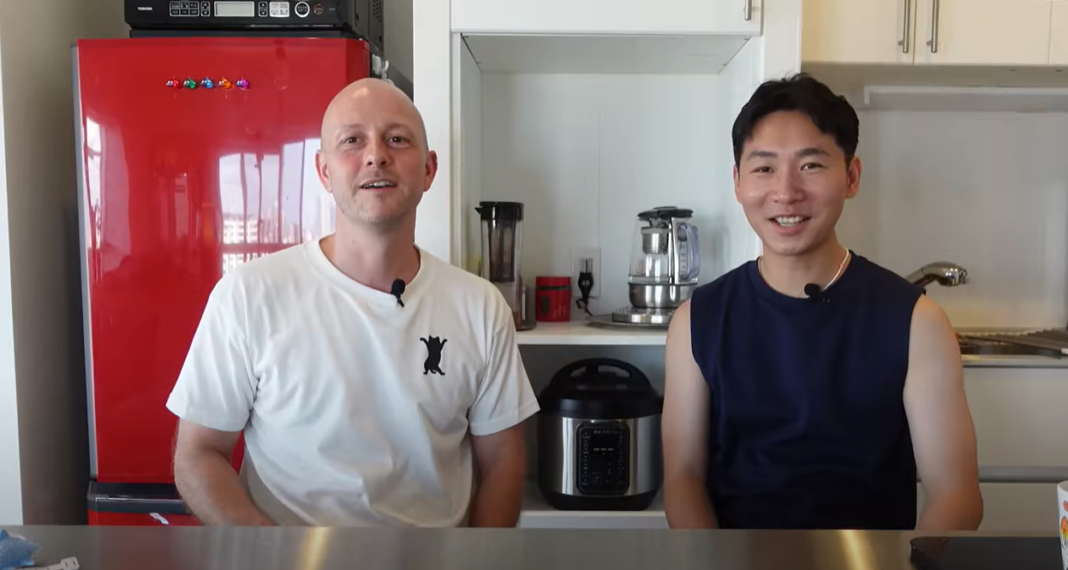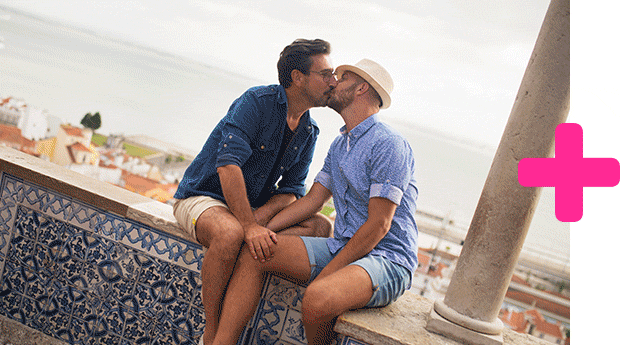Andrew and Meng, the two guys behind the YouTube channel TokyoBTM, were both interested in Japanese culture before they made Japan’s capital their long-term homes. Andrew, who is originally from Victoria, British Columbia, had done a one-year exchange in high school, then came back for post-secondary studies; he’s now a project manager. Meng, who is from Hangzhou, China, did a summer exchange program as a student, then came back to do an internship before launching a career in the entertainment industry.
They were introduced by a mutual friend at a gay pool party at the Hilton Tokyo Bay (1-8 Maihama, Urayasu, Chiba) at Tokyo Disney Resort. During COVID-19, they were drinking bubble tea, talking about what to do now that they had more free time on their hands, when Andrew said he wanted to start a YouTube channel. Meng suggested that recording start the very next week, and TokyoBTM, which always starts with the greeting, “Hi, Tokyo tops!” was born.
Wander+Lust caught up with Andrew and Meng to find out more about Tokyo’s gay life—and all the expectations and rules that govern it.
What was the idea behind TokyoBTM?
Andrew: I noticed that a lot of people, friends or whatnot, when they would travel, had this misunderstanding about Japan, that it was some sort of gay desert. But there’s a lot of interesting gay life here that is just not known, things that exist in the shadows. I was really involved in the community, especially during my student days, so there was a side of me that wanted to introduce it to the world, and it was something that both Meng and I could talk about.
Meng: You were so excited to expose the hidden side of gay life.
What’s Tokyo like to live in versus coming as a tourist? You both started out as visitors before you became residents.
Meng: I was very much in love with Japan. I thought everything was wonderful when I was an exchange student. But now I feel like it’s not perfect. People who move to Japan have to get used to the work culture here. How people deal with each other is very different from whatever you’re used to, wherever you’re from. Japan is a really rare case.
Andrew: Coming from Victoria, it was night and day. When I was living there, things shut down or got very quiet at, like, 6 p.m., 7 p.m. Going to Tokyo, which has a population close to Canada’s but all in one city, blew my mind. Everything just seemed so convenient, available. That’s the initial tourist reaction. Once you start living here, it becomes harder in a lot of ways. When I moved here, all of my friends were working until 9 or 10 p.m. I would say, “Let’s go out drinking.” They’d say, “I’ll meet you there.” It would be 11 p.m. and they’d just say, “Sorry, I’m stuck at work. I’m not even going to be able to get home.” It has changed since then.
Watching your videos, there are so many concepts, expressions and tribes that a Westerner has to get their head around. “Ryousan-gata” is kind of like a gay clone, but with a very specifical masculine look. “Nihon dakara” is given as a reason why a rule exists or why a foreigner isn’t welcome.
Andrew: Or there’s “nemachi,” which is when you’re at a bathhouse and people are pretending to be asleep in the little cubicles. If you’re Canadian and saw people doing that, you wouldn’t want to disturb them—you’re not going to start touching them without consent. But from a Japanese point of view, they’re like crocodiles, lying there and waiting to make their attack. Nemachi kind of means lying in wait. Then there’s GMPD. The initials stand for Japanese slang for certain body types in the bear community. There’s Gacchiri (muscular), Mucchari (thick/plump), Pocchari (chubby) and Debu (large). If you go to Ni-chōme, the gay area here, there are parties that are advertised as being only for GMPD or people who like GMPD. You’ll see on the apps that someone is maybe just G or just P, there are different combinations. A bear is something different here. It’s kind of lost in translation.
And what about a “hattenba”?
Meng: I would translate it as a sex club rather than a sauna, because I think of a sauna as having lots of water and steam. Hattenbas are usually dry. You can also translate it as “cruising spot” or “pig-sex venue,” stuff like that. If it was a cruising spot in a park, you would say hattenkōen, or in a washroom it would be hattentoire. I’d say they’re all under hattenba, but if you say hattenba, it’s usually a commercial establishment that offers a safe space for gay guys to make love.
At bars, saunas and hattenbas, some of the rules I’ve read about, around length of hair, tattoos, body weight, fitness and other factors, sound very daunting. Does it feel like that when you’re going to a place?
Meng: You get used to it. Recently, I read online that a couple got rejected by one of the hattenbas because they were required to have super short hair. But one of them was like, “I have a perm.” You have a lot of situations where people are separated into different groups based on looks. In Western culture, it might be considered a kind of discrimination. But in Japan, they don’t have this same understanding. Separation doesn’t mean segregation, doesn’t mean discrimination. Different parties and hattenbas can be very selective.
Andrew: Even this weekend, there’s a party at a bar only for guys under 39. I have two choices for how to look at that. I can say, that’s not okay. Or I can think, it’s a theme, in a way. If I was under 39, I may think, everyone’s going to be around my age, that’s a theme. Coming from Victoria, which essentially had just one gay bar, I realized there’s not a big enough population of gay people there for this sort of thing to happen. But we have 400 bars in Ni-chōme. You’re gonna find a bar that caters to you. I don’t wanna say it’s perfect, but it works out. There’ll be something else probably tomorrow or next week or whatever. Getting rejected at a bar is not so bad. They just say no. At bathhouses and hattenbas, it can be a little rougher. People can push you out. It’s harder on your ego.
How does a Western visitor there for a week or so even navigate such things?
Andrew: You watch our channel. [Laughs.] But I do tell people that there are a good number of foreigner-friendly bars in Ni-chōme, and I think you can just go there and talk to people about where to go. People are pretty friendly. The bartenders themselves are friendly. These bars are usually on the first floor and have open doors, with people pouring out onto the streets.
Okay, so give me a few options that would work for a North American or European traveller.
Andrew: For a bathhouse or hattenba, go to 24 Kaikan (2 Chome-13-1 Shinjuku, Shinjuku City, Tokyo; there are two other locations, one in Asakusa, one in Ueno). It’s closer to a wet sauna, which I think most Westerners are accustomed to. It is diverse with respect to body types, race and age. Not just diverse, but also welcoming. If I name other bathhouses, there are North Americans or Europeans who may get into them, others who may not because of their age or ethnicity, which makes them hard to recommend to everybody. At 24, they’re going to get in, and they’re probably going to find someone they like there.
Clubwise, I suggest Eagle Tokyo Blue (Casa Verde 1F, B1F Shinjuku 2-11-2, Shinjuku-ku, Tokyo) because it has a foreign feeling to it. It’s also one of the few places in Ni-chōme that takes credit cards—it’s bridging the gap of traditional Japanese bar style with more of an international audience. They do RuPaul parties. They have drag queens doing shows, voguing and putting on karaoke nights. They have unlimited drinks for 1,500 yen (CA$14), which is unheard of.
Meng: For me, I’m going through a party-boy chapter of my life, so I have new favourites. My favourite bar right now is actually not a gay bar but an LGBTQ+-friendly speakeasy called KAKURETAI (160-0007 Tokyo, Shinjuku City, Arakicho, 1−2 B1), which means to be hidden. It’s not in gay town, but it’s very close. It’s a really great vibe. They have DJ events every single Friday. I really love the drinks, which are very creative.
If you want to hit it more Japanese style, I think AiSOTOPE Lounge (160-0022 Tokyo, Shinjuku City, Shinjuku, 2 Chome−12−16 1F) is worth checking out. It’s the biggest gay club in Ni-chōme—something is happening there every single weekend.
This interview has been edited for length and clarity.


